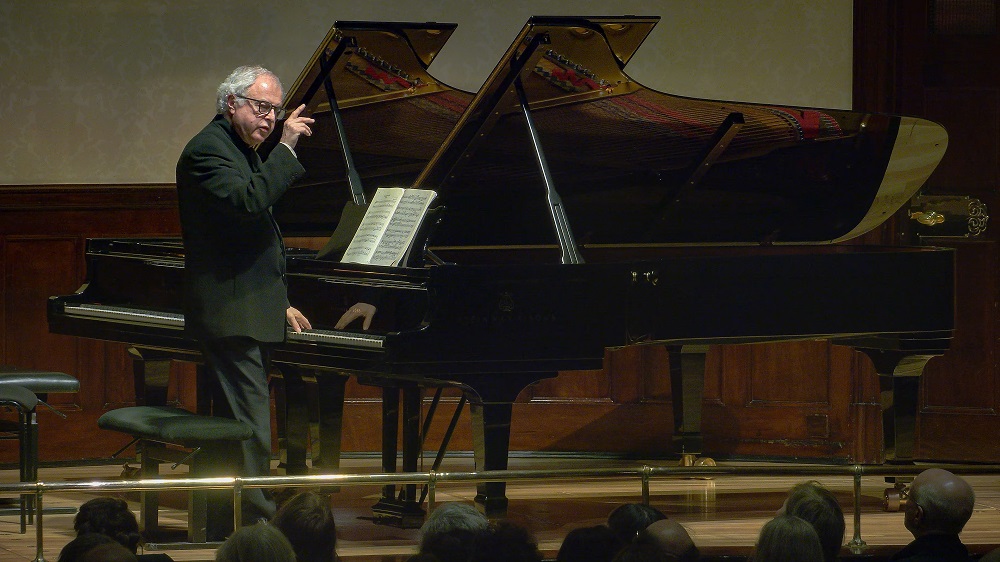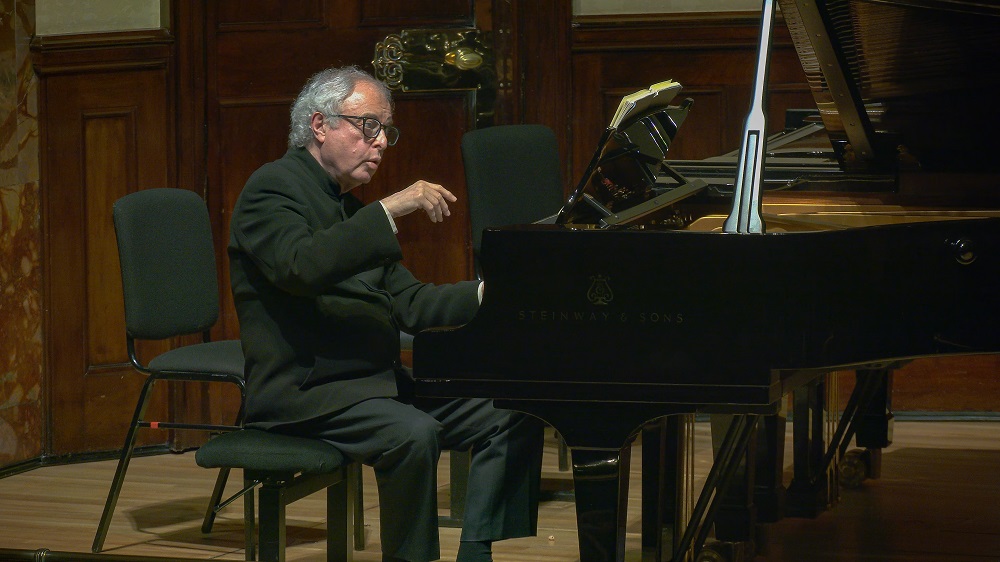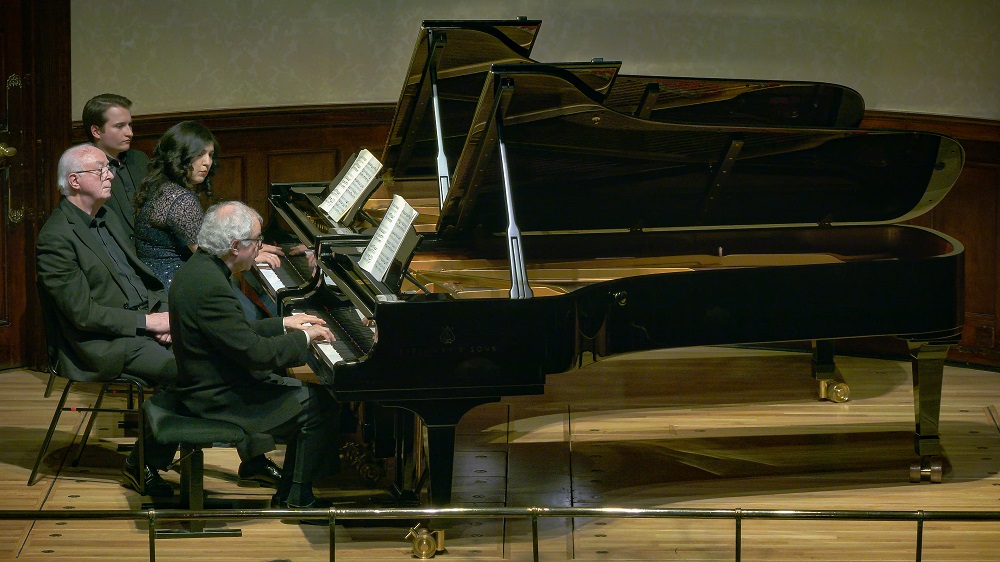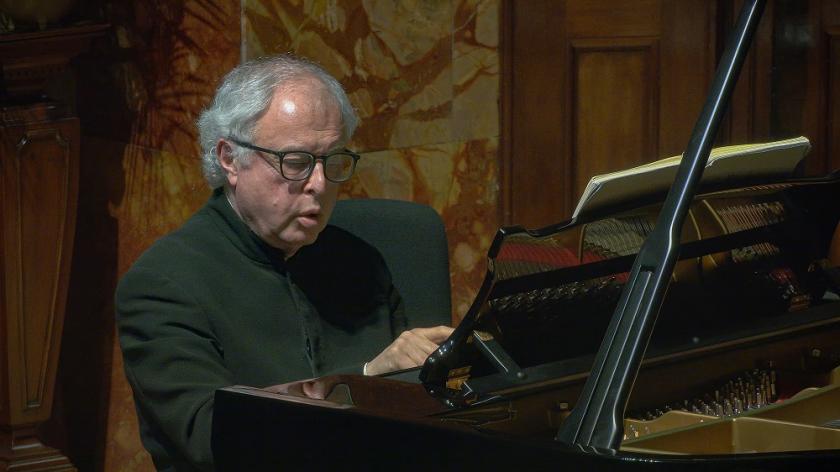At the start of his 75-minute pre-concert lecture on Sunday, the incomparable András Schiff staked quite a claim for the piece he was about to perform: Bach’s The Art of Fugue was, he said: “the greatest work by the greatest composer who ever lived”.
And a wise one: this concert was only the second time he would ever play it, the first having been in Berlin last January. Because, he said: “I’ve waited 70 years to play this work… You cannot climb Mount Everest immediately… this is the climax.”
He continued with a poetic clarity akin to that of the piece itself. On the fact that it is unfinished: he cited the note by CPE Bach that “at this point [during Contrapunctus 14] the composer died”. And disdain for those who would feign "finish" it, with a reference to Michelangelo’s Prigioneri in Florence: “Who in their sane mind would think to come with a hammer and chisel and start banging away at Michelangelo’s marble?”  Then things went wrong.
Then things went wrong.
Schiff had already cocked a jocular snook at “technology” by saying that full programme notes were available on the Wigmore Hall’s “website”, though he himself had no idea how to access that, and praised Bach’s handwriting – “who writes letters any more?” Then his microphone attached to a headpiece started making awful feedback noises, breaking the spell. Schiff ploughed on, but eventually removed it, to continue without amplification.
Scurrying staff provided another mike, hand-held, but it too began to screech. Schiff tried yet another: “I had not intended this to become a comedy show,” he offered gallantly – it was excruciating. He cast the mike aside, then the other, to speak unaided, for all the soft sonority of his voice. But even from the floor, the microphones squealed and whined. Usually elegant Schiff picked them up in turn, threw and smashed them into the corners – kaput. “This technology is a disaster,” he spat, uncharacteristically for such a musical shaman, in half-amused, dismissive rage, referring, it seemed, not just to this shabbiness, but the whole damned thing.
For a venue of this repute to insult and potentially humiliate a star of Schiff’s renown with its own ineptitude is unforgivable. As a result, those paying for better seats could hear Bach’s mysteries eloquently unlocked with illuminating sagacity – others with difficulty, if at all. Worse, Schiff was left alone to cope and dispose of these wretched machines as he did; clueless staff seemed not to care, and the chaos was then aggravated by streams of latecomers allowed in to find their seats while Schiff bravely prepared us for the wonderment to follow.
Which he did, and which it was, so that even this offensive mediocrity failed to spoil the night: which belonged to Bach, and to probably the greatest living exponent of his music, ready at last, by his own exacting standards, to give this masterpiece of ingenuity, complexity and lucidity entwined. Humble before his master, Bach, Schiff becomes a master too.  The opening "group" of four Contrapuncti establishes simplicity made complex, but also vice-versa – the infinite possibilities of a primary melodic idea. The second group opens with a stretta in Contrapunctus 5, followed by the stilo francese variations of Contrapunctus 6. The diminutions and augmentations of Contrapunctus 7 began to haunt the space of the hall: “it's difficult to follow,” Schiff had said of these, “but believe me, it’s all there.”
The opening "group" of four Contrapuncti establishes simplicity made complex, but also vice-versa – the infinite possibilities of a primary melodic idea. The second group opens with a stretta in Contrapunctus 5, followed by the stilo francese variations of Contrapunctus 6. The diminutions and augmentations of Contrapunctus 7 began to haunt the space of the hall: “it's difficult to follow,” Schiff had said of these, “but believe me, it’s all there.”
The third group starts with Contrapunctus 8, intricate and complex, while Contrapunctus 9 affirms this aqueous quality to Schiff’s Bach, like a waterfall, river’s current or tide that ebbs and flows, ever-changing, but a continuum.
The intricate mathematics – fugal subjects and their counterpoints, the "rectus" and "inversus" sections; questions and answers, in a way – are also mystical. If there is one piece to illustrate Pythagoras’ notion of music as the sound of "celestial spheres", it is this.
So the overall sense is one of trance, a hypnosis that enchants. This is "scientific" music, Schiff says, “in part to fulfil a pedagogical function” reads the programme. But it is also "Santus", in its way.
For all the mathematical perfection, Schiff loves and plays cantabile, so that melodies sing out; “The piano is not a percussion instrument,” he had said.  And so to the last group, where, in Contrapunctus 13, “to play this and the inversion, you need a third hand,” joked Schiff. Bach accordingly wrote versions of the rectus and inversus of this section for two pianos, for which Schiff was joined by Schaghajegh Nosrati (pictured above).
And so to the last group, where, in Contrapunctus 13, “to play this and the inversion, you need a third hand,” joked Schiff. Bach accordingly wrote versions of the rectus and inversus of this section for two pianos, for which Schiff was joined by Schaghajegh Nosrati (pictured above).
Then to Contrapunctus 14, with its steps towards whatever lies beyond this life, or so it felt by now. Fourteen is an important number in Bach, said Schiff, with significances in the Partitas and elsewhere. Bach’s non-finale is charged with a return to simplicity, reaching the subject that spells his name: Bb-A-C-B# (BACH) – which then vanishes into thin air – one of the most remarkable moments in music. Schiff kept his head low, to achieve as long a meditative silence as possible.
It takes a lot to get this entire audience on its feet, but this was inevitable tonight: for the rarity and quality of the music and its playing, and for Schiff’s overcoming the initial ordeal to do so.













Add comment